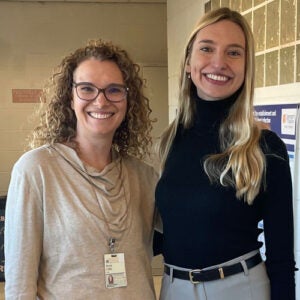
(From left) Anna Cliffe, PhD, and Sara Dochnal, PhD
Anna Cliffe, PhD, an associate professor in the Department of Microbiology, Immunology, and Cancer Biology, was awarded a $3.3 million R01 grant from the National Institutes of Health for a project titled “The Regulation of HSV latency by Polycomb silencing.”
The Cliffe lab studies mechanisms of Herpes Simplex Virus (HSV) latent infection and reactivation in neurons. More than 60% of the U.S. population is infected with the virus, which can cause a range of disease outcomes, including oral and genital lesions, keratitis, and encephalitis, and potentially contribute to the development of Alzheimer’s disease. The virus persists for life as a latent infection of neurons and can periodically reactivate in response to a variety of stimuli to cause disease.
The new R01 will investigate the contribution of a form of gene silencing known as Polycomb silencing in both the establishment of HSV latency and reactivation. Polycomb silencing is a reversible form of gene silencing that regulates the expression of cell-type specific genes during development, and it can also be deregulated in cancer. HSV establishes a latent infection in fully differentiated neurons, where little is known about the mechanisms of Polycomb silencing and its role in gene silencing. A former graduate student and postdoc in the Cliffe lab, Sara Dochnal, PhD, found that Polycomb silencing of HSV DNA plays an important role in allowing HSV to become latent in neurons in a way that can also permit the virus to reactivate. The study aims to understand the mechanisms by which Polycomb silencing permits the formation of a reactivation-competent latent infection. The Cliffe lab will also investigate how a viral non-coding RNA expressed in neurons promotes Polycomb silencing on the HSV-1 genome to enable latency establishment in a way primed for reactivation. The long-term goal is to develop therapeutics that can prevent reactivation by ultimately manipulating the type of gene silencing on the HSV-1 genome.
This new R01 fits into the larger goals of the Cliffe lab, to understand the mechanisms and consequences of HSV-1 latent infection of the nervous system. A second, recently awarded R01 will investigate a form of latency initiated by the protein ATRX, which is contrary to Polycomb silencing as it results in a more restricted form of gene silencing that is resistant to reactivation (read the Medicine in Motion story to learn more.) A third R01 awarded in 2023 is a collaborative R01 with Tal Nuriel, PhD, at Columbia University and Nancy Sawtell, PhD, at the University of Cincinnati, along with assistance from John Lukens, PhD, at UVA, to investigate the consequence of long-term HSV-1 infection to the development of Alzheimer’s disease. Two new R21 grants from the NIH will fund research into the molecular mechanisms of HSV-1 reactivation.
Seed funds for this project were provided by the Owens Family Foundation and UVA Gap funding. Sara Dochnal was previously supported by the UVA T32 Training grant on Training in Cell and Molecular Biology with principal investigators Todd Stukenberg, PhD, and Bryce Pascal, PhD, and a UVA Wagner Fellowship. David Kashatus, PhD, and Clint Miller, PhD, are collaborators on this project. Dr. Kashatus has been instrumental in developing a method for quantifying the co-localization of HSV-1 genomes with nuclear proteins and Dr. Miller provides key bioinformatic support.
Filed Under: Research
